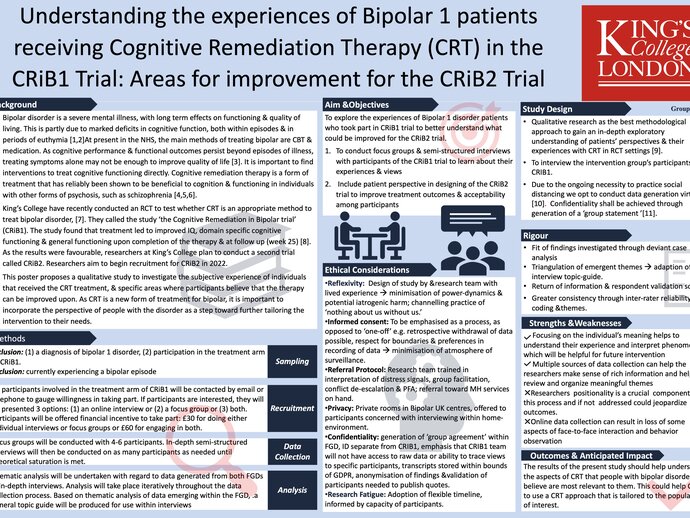Meet the Qualitative Researchers: Samuel Swidzinski
Samuel Swidzinski is a Global Mental Health MSc student at King's College London. He will begin a PhD at King's later this year, drawing on his background in mental health practice, his own lived experience, and his academic interests to investigate cognitive decline and cognitive remediation in people with bipolar disorder. Here, he shares his experience of participating in a group project in a qualitative research MSc module, including his initial reluctance and everything he learned about the value of collaboration along the way...
I was scared of group assignments, now I want to advocate for them
I never thought I would enjoy being part of a group project. I like working alone and struggle with social anxiety. But embracing the experience has not only led me to learn a lot from all of my teammates; it has also led to our team designing a qualitative study that may become a real research project!I enrolled in a qualitative research module with Dr Vanessa Lawrence and Dr Kritika Samsi and was feeling rather anxious when I heard that the assignment was to engage in a group project, to create a poster for a qualitative study and do a group presentation.
My general reaction to that kind of experience is to curl into a ball and use any method I can to do the project by myself! I know I am not alone in this feeling. Perhaps you experience a similar aversion to group work.
I have a diagnosis of bipolar disorder and years of illness has led me to struggle in social situations.
I decided to embrace the situation and attend the first group meeting. At the start I felt quite anxious. Oddly when I feel anxious, I talk quite a lot, so found myself becoming the facilitator of the group!
I told the group about an idea I had for a qualitative study. I have 1+3 ESRC-funded studentship and am doing a PhD in a form of therapy called Cognitive Remediation Therapy (CRT) for bipolar disorder. I told the group that I wanted to do a qualitative study on the subjective experiences of people with bipolar that have engaged in CRT in the past, as I felt it could help in the improvement of future CRT trials.
The group fully embraced the idea and were excited to work on this project. We all had different skills and the combination of all of our abilities is what helped us to create a great project. I am quite new to qualitative research and although I’ve learnt a lot from the course, integrating and applying all the knowledge alone would have been hard.
Vanessa, Kritika and my supervisors are keen on the qualitative research idea. Since beginning work on this project, I have been given the responsibility of being the PPI (patient and public) invigilator for CRT studies at King’s. This opportunity would not be possible if it weren’t for the fantastic group project our team created. I’m very grateful to the team and hope that we can create a fantastic qualitative study from it that can enhance the value of CRT for people with bipolar disorder, and that we can get some publications for our hard work!
So, if you are anxious about being part of a group project OR if you are a lecturer who is wondering whether they should set up a group project within your module, I’ll tell you this:
If you embrace group work, no matter how hard that you feel you find social situations, you could create something much bigger and much better than something you could do alone.
People on masters’ programmes have different skills and come from a great variety of backgrounds. That can make things challenging as it can sometimes be difficult to relate to people that are coming to the same problem from different angles. But, if we all listen to each other and embrace the project, then we are able to develop internally as an individual as well as develop as a group.
Our team had members from across the globe. All of us were passionate about psychology and mental health but worked in very different parts of the field. I was in awe of how many facts and methods different members of the group taught me about that I had never heard of before. The world of mental health is vast, and the world of global mental health is even more so.
These discussions when developing a piece of qualitative research helped us to decide how we could gain the richest insight into participants’ concerns.
I also felt fortunate to be part of a group that accepted my expertise as someone with lived experience. Having lived experience of bipolar helps me to understand the perspectives of people with the disorder. Having been a participant in CRT research and now working with it was definitely an asset to the design of the study.
From someone who struggles a lot with social anxiety, sometimes throwing ourselves in at the deep end is actually beneficial. So, next time that you are given a group project, try to embrace it. Try to listen, try to learn and try to combine all your skills in a way that can create something great! I believe in you!
Samuel Swidzinski was one of a number of talented students on the Qualitative Research: Theory, Methods & Practice MSc module who worked in small groups to design an innovative qualitative study in the field of mental health. Please click here to see some of their fantastic work.
Thanks to Samuel and all the students from the Mental Health Studies MSc, Global Mental Health MSc, & Developmental Psychology & Psychopathology MSc Programmes for their dedication and enthusiasm for qualitative research!


